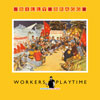BILLY BRAGG : WORKERS PLAYTIME
- She's Got a New Spell
- Must I Paint You a Picture? (with Cara Tivey)
- Tender Comrade
- The Price I Pay
- Little Time Bomb
- Rotting on Remand
- valentine's Day Is Over
- Life With the Lions
- The Only One
- The Short Answer
- Waiting for the Great Leap Forwards
Label : Line Records
Released : 1988
Review (AllMusic) : By the time Billy Bragg began recording Workers Playtime in the fall of 1987, he'd gone from a rabble-rousing leftist songwriter and D.I.Y. one-man punk band to a bona fide pop star in the U.K., and had won a sizable cult following (and a major-label recording contract) in the United States. In addition, Bragg had begun expanding the stark sound of his early recordings on his 1986 album Talking with the Taxman About Poetry, and the sessions for Workers Playtime found Bragg and producer Joe Boyd building actual arrangements around his tunes as he struggled to balance a broader and more eclectic musical approach with the small-p politics that were his stock in trade. This struggle is practically audible on Workers Playtime, and this time out Bragg's songs about the ups and downs of relationships outnumber (and are more satisfying than) his polemics, and he seems torn between the comfort of the spartan simplicity of numbers like "The Only One," "Valentine's Day Is Over," and "Must I Paint You a Picture" and the more expansive approach of the rollicking "Life with the Lions" and the appropriately mysterious "She's Got a New Spell." Significantly, two of the album's most explicitly political numbers, "Rotting on Remand" and "Tender Comrade," are also the least satisfying tracks here, and the album reaches its finest moment when Bragg musically and lyrically faces the contradictions of this turning point in his career head on with the splendid final number, "Waiting for the Great Leap Forwards." Workers Playtime has a number of pearly moments, but it was also Bragg's first genuine disappointment, and was the first step in the uncertain second act of his recording career.
